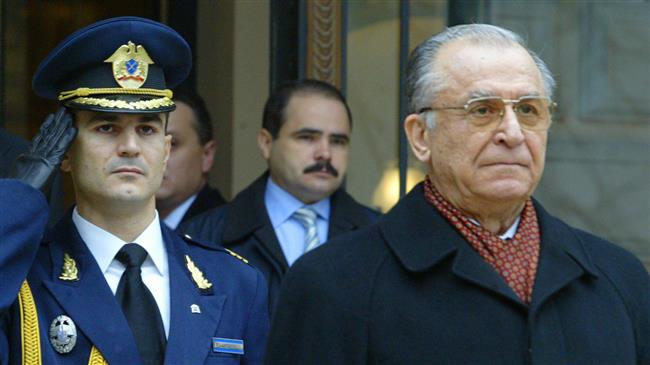Romania ex-pres. to be tried for crimes against humanity
Romania's former president Ion Iliescu has been ordered to stand trial for crimes against humanity for his role in the deadly aftermath of the 1989 revolution that toppled the country's communist regime, prosecutors say.
"It is a particularly important moment for Romania's justice system that is fulfilling a debt of honor to history," chief prosecutor Augustin Lazar told reporters.
The announcement caps a long-running investigation made more difficult by an official reluctance to revisit the 1989 revolution's bloody aftermath.
Iliescu, now 89, had been a minister in the government of communist dictator Nicolae Ceausescu and went on to lead the National Salvation Front, which took control of the country after the uprising which began in the western city of Timisoara on December 16, 1989.
Iliescu was elected president in 1990 and served another term from 2000 to 2004.
It is now up to a Romanian high court to set a date for the trial.
Iliescu was indicted last December with three others.
Two of them -- former deputy prime minister Gelu Voican Voiculescu and former air force commander Iosif Rus -- will also stand trial.
The case against former prime minister Petre Roman has been dropped for lack of evidence.
Prosecutors accuse Iliescu and Voiculescu of "directly spreading misinformation through televised appearances and press releases, contributing to the institution of a generalized psychosis."
Their pronouncements increased the risk of "instances of friendly-fire, chaotic shooting and contradictory military orders," prosecutors have said, with 862 people killed after December 22 when Iliescu took control.

The men's actions also allegedly helped lead to the conviction and execution of Ceausescu and his wife "through a mock trial."
Iliescu will also have to answer accusations of "crimes against humanity" over the smashing of a protest in Bucharest in 1990 that left four people dead.
Both Iliescu and Voiculescu have denied any wrongdoing, with Voiculescu describing the accusation as an "act of political revenge."
According to prosecutors, 275 people have already faced legal action over their role in the attempted crushing of the uprising.
However, according to victims' support groups, only a few dozen have been convicted.
The fall of Ceausescu came at the end of a momentous year in which communist regimes collapsed across central and Eastern Europe -- with the Berlin Wall coming down in November -- presaging the demise of the Soviet Union at the end of 1991.
(Source: AFP)
Israel indicts two settlers over suspected spying for Hezbollah
Iran: US airstrikes on Yemen war crimes, violation of international law
Yemeni armed forces down F-18 fighter jet, repel US-UK attack: Spokesman
Iran warns against US-Israeli plot to weaken Muslims, dominate region
VIDEO | Public uproar in US against Israeli regime
‘Ghost town’: 70% of Jabalia buildings destroyed by Israel
Mother’s Day: Sareh Javanmardi’s inspiring journey as Paralympic champion and mother
Russia downs over 40 Ukrainian drones as Putin vows 'destruction' on Kiev














 This makes it easy to access the Press TV website
This makes it easy to access the Press TV website